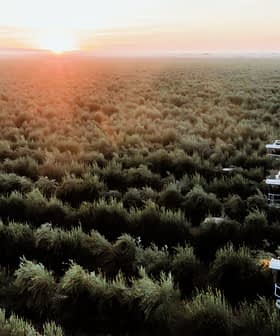The many challenges olive oil producers are currently facing in Southern Italy have reached a new high: official data show a relevant slowdown in olive oil export from the Puglia region in the first three months of the year.
ISTAT, the National Institute of Statistics, estimated exports in the period had fallen by 10.4 percent compared to the same period last year. Those data are even more relevant considering that Puglia, with its 60 million olive trees, is by far the leading Italian region in terms of olive oil output.
Although they do not come as a surprise given the conditions of the international market in the Covid-19 era, the new figures alarm growers.
The Apulian branch of the farmers association Coldiretti warned that the export collapse adds to an already dire scenario for sales and prices.
Coldiretti noted that olive oil storage facilities in Puglia are full. According to the official data released by the Ministry of Agriculture special observatory on olive oil, more than 70 million liters of extra virgin olive oil are currently stored — a 128 percent increase over last year.
Savino Muraglia, Coldiretti Puglia’s president, blamed the Covid-19 lockdown for restaurants and food venues for the skyrocketing storage.
Muraglia called for “new informative and cultural campaigns both on regional and national levels that in the next five years, with adequate financing and a coordinated strategy, will promote the signature product of the Puglia region, which is extra virgin olive oil.”
While the latest data on olive oil prices in Puglia did not show any relevant variation after the slow but steady contraction of the last few months, farmers have reason to worry as the next harvesting season approaches, and their concerns have spilled over to local politics.
Elected members of the Forza Italia party have called for new protective measures in a show of support for new actions proposed by the Spanish government in the last few weeks to bolster prices.
“The most relevant olive oil production region in Spain, Andalusia, is asking its own Ministry of Agriculture to adopt a mandatory mechanism for olive oil storage to stop the price crisis,” said party members Mauro D’Attis, Dario Damiani and Francesco Losito. They want local farmers to join in and ask for those same measures to be adopted in Puglia.
While discussions are ongoing, Muraglia stressed how important it is “to spread EVOO culture among consumers, because they want information and knowledge about the olive oil world.”
“The Apulian farmers and mills have learned from the lessons coming from the wine world, where skillful marketing and focused promotion of the local productions brought Apulian wines all over the world.”








